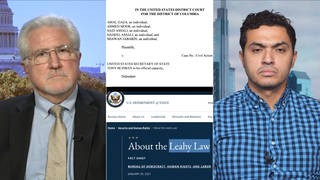
Months ago, a State Department panel urged the Biden administration to disqualify multiple Israeli military and police units from receiving U.S. aid over serious human rights abuses, including rape and torture. According to ProPublica, Secretary of State Blinken received the recommendation in December but has still not taken any action. “[Israeli] Prime Minister Netanyahu, Benny Gantz, they have been publicly and fiercely lobbying against any proposed sanctions,” says ProPublica reporter Brett Murphy. “Gantz said he called Blinken personally and they talked about it. They want him to reverse course.”
Transcript
AMY GOODMAN: This is Democracy Now!, democracynow.org, The War and Peace Report. I’m Amy Goodman, with Juan González.
Months ago, a State Department panel urged the Biden administration to disqualify multiple Israeli military and police units from receiving U.S. aid over serious human rights abuses, including rape and torture. That’s according to an article in ProPublica which reports that Secretary of State Blinken received the recommendation in December but has still not taken any action.
We’re joined now by Brett Murphy, reporter for ProPublica, where his latest pieces are ”Netanyahu Resists U.S. Plan to Cut Off Aid to Israeli Military Unit” and ”Blinken Is Sitting on Staff Recommendations to Sanction Israeli Military Units Linked to Killings or Rapes.”
Brett, welcome back to Democracy Now! So, this latest piece, lay out what is this State Department panel that made this recommendation, and talk about what Blinken has done since.
BRETT MURPHY: Yeah, it’s a very special panel. It’s unique to Israel. Other countries do not have this sort of consideration. And what it’s supposed to do is review allegations, allegations of a gross human rights violation. That could be an extrajudicial killing. That could be a rape. And they look at public reports, and then they see if the Israeli government has held the individual perpetrators accountable. If they haven’t, if they haven’t held them accountable, then they’re supposed to make a recommendation, make a recommendation to either stop giving aid to that specific unit or to continue allowing aid to go to that unit.
This has never happened in the history of Israel. Almost every other country where we give foreign assistance to, they have units who are disqualified from that type of aid, but not Israel. Finally this happened in December for the first time ever. Recommendations went up to Blinken to sanction specific units inside of the Israeli military. But for months now he has not done anything with those recommendations.
JUAN GONZÁLEZ: And, Brett, could you talk about one of those units, Netzah Yehuda, the country’s all-male, ultra-Orthodox battalion?
BRETT MURPHY: Yeah. So, Juan, there has been some reporting over the weekend that one of the units that went to Blinken was Netzah Yehuda. This is an ultra-Orthodox, all-male battalion. It had been operating largely in the West Bank for years. It was founded around 1999. And for years it’s been accused of human rights abuses, shooting civilians, beating civilians, so much so that a few years ago it was actually removed by the government of Israel from the West Bank and relocated to the Golan Heights.
JUAN GONZÁLEZ: And also, could you, for those who are not familiar with the Leahy Amendment, the 1997 law that requires the United States to cut off financial aid to — or, military aid to units that are accused, credibly accused, of human rights violations?
BRETT MURPHY: Sure. So, the Leahy Law was developed specifically to address specific units inside of any foreign government. There are other laws on the books that are much broader, much more general, but they’ve never been implemented in a systematic way, so the Leahy Law wanted to address that. Senator Leahy and others thought if the State Department could identify specific units inside of these governments and then disqualify them from receiving aid, then that would have, you know, more of a salutary effect than they had been seeing with previous laws.
Like I was saying before, most other countries have to apply for aid on a unit-by-unit basis, so they will first ask the State Department if they can use American financing for equipment, arms, training, that sort of thing, and then the State Department will review that unit, see if they’re on the no-fly list, if they’ve been disqualified. But for Israel, Egypt, it’s different. They receive so much aid, so much financing, that the State Department has been largely blind to what specific units are using that aid. That’s why they came up with this forum, this amendment in 2019. This forum was meant to kind of look back and address specifically which units should be disqualified, and then we would give that list over to the governments of Israel and Egypt.
AMY GOODMAN: And finally, just to be clear, Brett, we’ve heard in the last days that Biden is cutting off aid to the ultra-Orthodox unit. Talk about — was there a meeting between Blinken and Benny Gantz? Is this aid being cut off?
BRETT MURPHY: So, he’s been asked — Secretary Blinken has been asked several times, as well as his spokespersons, what’s the status of those cases. And he has so far punted. And we know over the weekend Prime Minister Netanyahu, Benny Gantz, they have been publicly and fiercely lobbying against any proposed sanctions. Benny Gantz said he called Blinken personally and they talked about it. They want him to reverse course.
AMY GOODMAN: Well, I want to thank you so much for being with us, Brett Murphy, reporter for ProPublica, where his latest pieces are ”Netanyahu Resists U.S. Plan to Cut Off Aid to Israeli Military Unit” and ”Blinken Is Sitting on Staff Recommendations to Sanction Israeli Military Units Linked to Killings or Rapes.”
Coming up, climate activists are gathering at the global headquarters of Citigroup, as we broadcast here in New York, to demand the bank stop financing coal, oil and gas. Stay with us.












Media Options